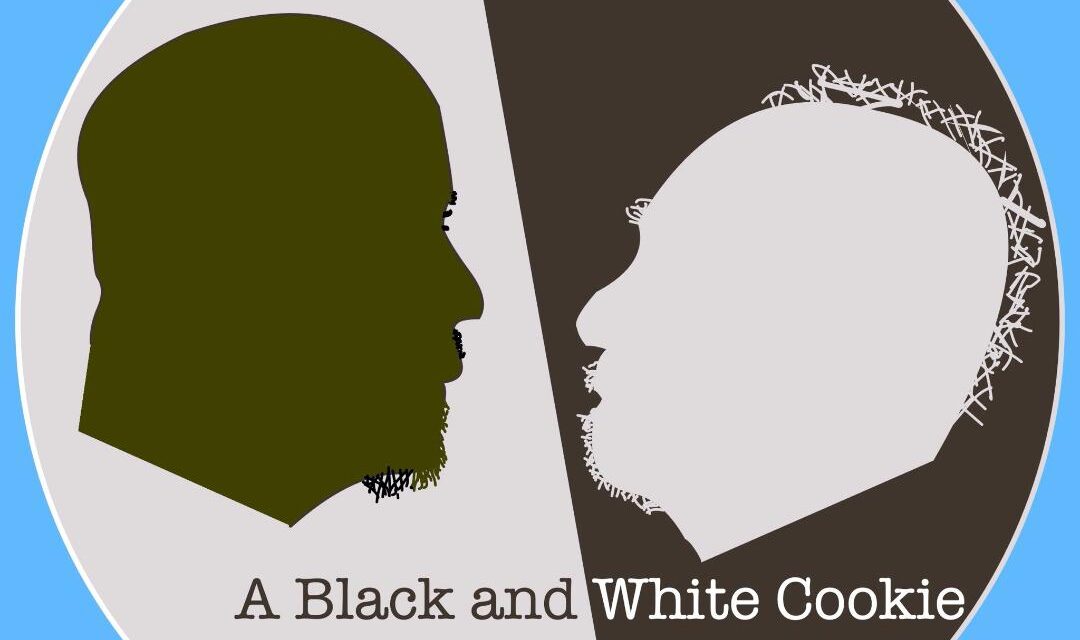Gary Morgenstein’s nostalgic yet au courant play A Black and White Cookie is an invigorating feature of Theater for the New City‘s new On the Air series of Zoom presentations. Cookie was originally slated to premiere at TNC in late March of 2020, before Covid-19 forced the cancellation of all live performances. Morgenstein subsequently revised the script to integrate elements of Covid-reality into a heartening and spirited story of two mature men who forge an unlikely bond in the East Village, mere blocks from the theater’s home.
The two main characters are Harold Wilson, an African-American newsstand owner, and Albee Sands, a Jewish radical whose stability, mental and financial, is intriguingly uncertain. Albee is a crusty New Yorker, the sort you’re more likely to read about than witness these days. Scoring his free day-old newspaper and a sandwich at the newsstand is apparently his chief purpose in life. Albee’s an eccentric, an old-timer who’s likely enjoyed a rich history of political activism yet he seems somewhat adrift and rudderless. The world around him has dramatically altered yet he appears to exist in his own bubble, unable to process the changing times or to find a place in a world that has largely moved on from print news to social media and the 24-hour news cycle. He’s a poignant metaphor for the seemingly anachronistic world of 20th-century transformative activism. His plight as an idealist stuck in the waning days of the transactional cynicism of the Trump era is one of the evening’s most resonant elements.
Harold is a similarly magnetic character, played with a wonderful sense of wry subtext by Mansoor Najeeullah, the production’s most accomplished performance. An outwardly gruff and stubborn character, Harold is nonetheless a homeowner and businessman who seems to view himself as a success or at least a survivor. His backstory includes a queer niece who’s trying to encourage him to sell his newsstand and house and follow her down to Florida. The story opens with Harold having recently reopened his kiosk, the setting for much of the play’s action, following a temporary closure due to Covid. He’s soon hit with news that his rent will be increasing far beyond what he can afford and that’s when Albee inspires him to fight the landlord and the attendant rent spike.
Much of the heart of the play entails the hesitant dance of friendship between these two unlikely mates. Morris Schorr manages to convey Albee’s retrograde ideology while also embodying selflessness that betrays a poignant naivete. The banter between the two men is engaging and offers Morgenstein an opportunity to comment on the storied relationship between politically engaged, liberal Jews and proximate African-Americans in the nexus of New York City. This symbiosis reached its apex in the 1960s and 70s when Jews advocated for Blacks whose oppression they identified with and sought to dismantle. It’s therefore intuitive that Harold is more receptive to Albee’s offer of assistance in challenging Harold’s landlord while his niece Carol is more skeptical. Roslyn Seale plays Carol with a layered sense of maternal worry for Harold while also attempting to conceal her dispassion for Albee. She also astutely embodies a certain cooling of the once-warm bond between Blacks and Jews, embracing a more prevalent sense of “We got this”-ness which seeks to dispense with this once valued inter-cultural bond.
As this is technically a reading and is offered via Zoom, there are inherent limitations to rendering the evening to its full potential. The strength of the writing is evident in Joan Kane’s solid direction and in the inspired work by the cast. The acting is more production quality than reading level and one is left yearning for a stage production to see the play come more fully to life. Zoom performances are rife with technical challenges yet “Cookie” never breaks between actors, who act as if they were next to each other on stage. The opening montage of city scenes is a wonderful nod to the inherent filmic nature of virtual performance as well.
The conflict that Carol introduces between the two men and particularly in her scenes with Albee is a highlight of the evening. The tension is organic and her antipathy toward Albee is authentic. If there are any thoughts for how a full production might prove even more resonant it would be to see the heat innate in the script become a bit more luminous, the strain between Carol and Albee more palpable, and the character of the landlord revealed as even more calculating. The Covid thread is an interesting counterpoint to an otherwise timeless story of an aging radical who can’t seem to abandon his antiquated vision of New York and a crusty businessman reluctantly contemplating migration from New York to Florida. Harold’s hesitation speaks to anyone who’s ever loved and considered leaving New York.
A crisp presentation by Ego Actus of a timely play that merits further discussion.
A Black and White Cookie is a presentation of Theater for the New City’s On the Air series.
This post was written by the author in their personal capacity.The opinions expressed in this article are the author’s own and do not reflect the view of The Theatre Times, their staff or collaborators.
This post was written by Jack Wernick.
The views expressed here belong to the author and do not necessarily reflect our views and opinions.

















